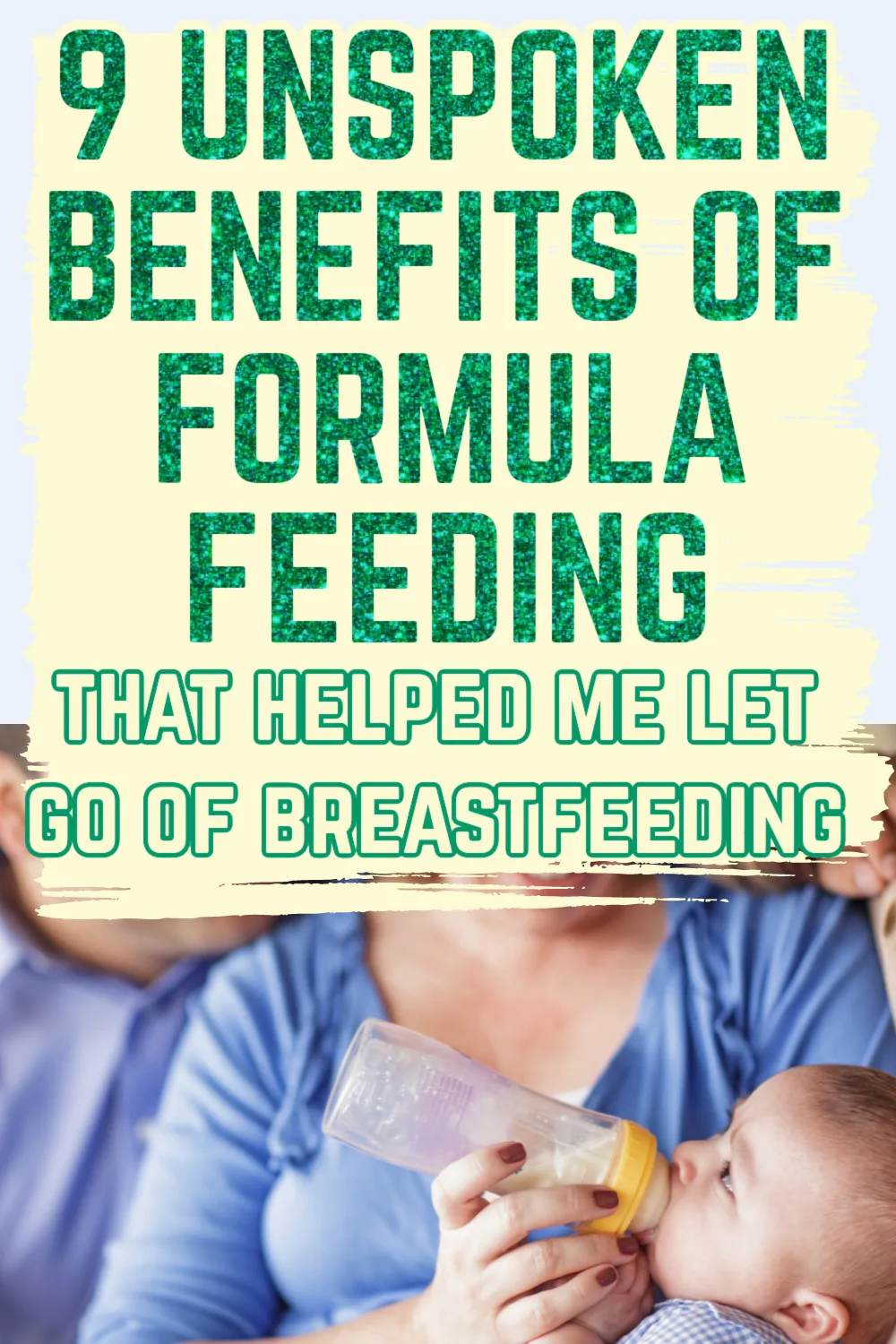Inside: Whether you’re considering using formula from the beginning of your baby’s life, or are struggling to let go of breastfeeding and embrace exclusive formula feeding, knowing these nine benefits of formula feeding for mom (not baby) can give you the support you need to start using formula full-time with confidence.
Before I had kids, I was 100 percent committed to breastfeeding. I knew there would probably be a learning curve, but I figured millions of women throughout history had fed their babies this way, and I would figure it out eventually.
It never crossed my mind that I wouldn’t reach my goal of breastfeeding for a year.
For a variety of reasons, I only made it to around the 3-month mark with both my kids, and that was only because I was able to supplement with formula.
After my oldest was born, I realized that while there was breastfeeding information and support nearly everywhere I turned, that was far from the case with formula feeding. No one was talking about the benefits of using formula, the many, many positive things that would have made it easier to stop breastfeeding sooner (because it really wasn’t working).
Instead, it felt like an inferior option at the time, one I had to work really hard NOT to feel guilty about.
While using formula was not in my original plans, it turned out to be a welcome change as I quickly discovered all the benefits of formula feeding for moms.
Whether you are a new mom switching to formula, or mama-to-be weighing the pros and cons of formula feeding for whatever reason (no reason is a bad reason), I hope this article will help you better understand the amazing benefits of formula and offer the support I didn’t have when I needed to make the switch.
Related: Formula Feeding Tips and Tricks – For the New to Formula Parent

9 Benefits of Formula Feeding
THIS POST PROBABLY CONTAINS AFFILIATE LINKS. AS AN AMAZON ASSOCIATE, I EARN FROM QUALIFYING PURCHASES. YOU CAN READ OUR FULL DISCLOSURE POLICY HERE.
1. You always know how much your baby is eating.
When breastfeeding, you never truly know how much your baby is eating, unless you have a baby scale and are able to weigh them before and after feedings.
With formula, you will always know exactly how many ounces your baby has consumed.
This can be especially helpful information if you have a baby that is having a hard time gaining weight. Your pediatrician can help you decide if your baby is eating enough.
Also, if your baby is unhappy but they just had a full feeding, you can safely assume their unhappiness is from another cause.
2. You don’t have to stress about whether breastfeeding is “working”.
At my first pediatrician appointment after my oldest was born, I learned he had lost too much weight. He continued to have a hard time gaining weight.
Long story short, my body was just not producing enough milk. And not knowing if my baby was getting enough from me while breastfeeding made it a very stressful experience, which probably made the problem worse.
In the end, I had to supplement with formula. Knowing exactly how much formula he was eating greatly decreased my stress.
3. Other people can help feed the baby.
This is an amazing benefit for a number of reasons. For starters, your partner can help with night-time feedings.
Sleep deprivation was a real beast the first few months of my son’s life. After we had switched to only formula and my husband was able to help with a feeding or two at night, it was a total game changer.
I was actually able to sleep for a decent stretch at a time, and having that little bit of extra sleep did wonders for me physically and mentally.
Second, there is just something special about feeding a baby, and bottle feeding allows everyone to experience it.
When your partner is able to feed your baby, it allows them to bond in a special way. This is also true for grandparents and siblings.
Allowing siblings to help feed a baby brother or sister lets them have a more active role when it comes to helping you with the baby, possibly lessening that new baby jealousy. Possibly.
4. You have SO much more freedom and flexibility.
You will have so much more freedom and flexibility when it comes to your daily schedule.
You can leave the baby in someone else’s care and not have to worry about being back by a certain time.
You can go out on dates with your significant either and not have to worry about rushing home because you feel as if your chest might explode.
You can even be gone for an extended length of time if you need to travel for work or want to go on a kid-free vacation.
Going back to work will be easier in some aspects because your baby is used to other people feeding him/her already.
Bonus: You won’t have to worry about dragging along a pump to work and trying to figure out when/where you can actually pump during your work day.
Related: Formula Feeding on the Go – 5 Tips from a Pro
5. Your gals can stay covered.
I have always been a fairly modest person. During pregnancy and childbirth, I pretty much had to check any modesty at the door, and that was expected.
But when I was learning to breastfeed, there were moments that felt pretty intrusive.
At the aforementioned pediatrician appointment, she wanted to see if my son was latching correctly. I was unprepared for this, and had no cover-up or nursing pillow.
It felt totally exposed, sitting in an uncomfortable chair trying to breastfeed in front of doctor I had just met.
Because I had several breastfeeding issues, I visited a lactation consultant 3 or 4 times. While she was very nice and helpful, any hope of a personal bubble was burst in those appointments.
I never felt very comfortable nursing in public. I could never really get the hang of nursing with a cover on, and physically it was hard for me to nurse without a stack of pillows.
Once I switched to formula, I no longer had to worry about trying to breastfeed in public or “demonstrating” to anyone else my nursing skills (or lack thereof!)
6. You won’t need to experience common breastfeeding pains.
I know the actual process of stopping breastfeeding can be painful for a lot of women. But once your body stops producing milk, you don’t have to experience the common pains associated with breastfeeding.
From sore, cracked, and bleeding nipples, to uncomfortable engorgement when you aren’t able to feed your baby on time, breastfeeding can be downright painful at times.
While I thankfully never experienced mastitis, I have heard from others about how excruciating that can be.
Related: Disadvantages of Breastfeeding – What I Wish I’d Known
7. You won’t need to buy breastfeeding gear.
If you don’t plan to pump, you won’t have to invest in one or the many accessories needed to pump.
You also will save lots of money on nursing pads, nipple cream, nipple guards, and expensive nursing bras. All of those expenses add up fast.
I know it seems like a small condolence when you look at the cost of bottle feeding equipment and formula itself, but it’s nice to know you’re saving something!
Related: Disadvantages of Formula Feeding – So You Can Be Prepared
8. If you switch from pumping to formula feeding, you can kiss the pump good-bye!
Let’s be honest, pumping sucks. (Figuratively and literally.) Not only does it take up a lot of time, especially for those mamas that don’t have a great supply to begin with, but it also can just be a huge inconvenience.
Pumping can be especially difficult if you plan to work outside the home after maternity leave.
Unfortunately, not all workplaces are very accommodating when it comes to providing places for moms to pump. Trying to find a private area to pump while at work can be quite a challenge.
And even if you do find a good spot, you then have to figure out how to transport your milk back home safely, and remember to drag your pump and all the needed accessories back and forth to work.
Plus, having to wash all the pump parts every single day can be time consuming.
9. Your body can get back to “normal” more quickly.
No, I’m not talking about losing all your pre-pregnancy weight in the first 3 months after giving birth. The number on a scale is just that— a number.
But for some women, being able to have their body back to themselves after giving birth can feel liberating and is an important part of reclaiming part of their identity outside of motherhood.
Breastfeeding can also be very hard on a woman’s body physically, with back and neck pain and loss of sleep, along with other problems mentioned previously.
Not having that constant demand on your body may help you physically feel better, sooner.
You also won’t need to wear special clothing or nursing bras to make it easier to breastfeed or pump, or worry about leaking accidents when you can’t pump or feed your baby in time.

Formula Feeding Is a Valid Choice – Fed Is Best
I hope you now have some new insight into the benefits of formula feeding.
But whether you end up breastfeeding, formula feeding, or a mixture of both, there is truly no right or wrong answer. I know “fed is best” is cliche, but it’s true.
Fed. Is. Best. So let go of any residual guilt once and for all.
There are pros and cons to every parenting choice under heaven. Weigh your options and make the best choice for YOU.
If you choose formula feeding, enjoy the benefits mama and be so very thankful we live in an age where formula is an option.
Related: Bottle Feeding Essentials – What You Truly Need and What to Skip

Mary Ann Blair is a stay-at-home mom living in the Pacific Northwest with her two little gentlemen and hubs. She loves connecting with other parents who like to keep it real!
Her writing has been published on Her View From Home, Perfection Pending, That’s Inappropriate, Pregnant Chicken, Sammiches and Psych Meds, Red Tricycle and in Chicken Soup For the Soul. She can be found at https://www.maryannblair.com